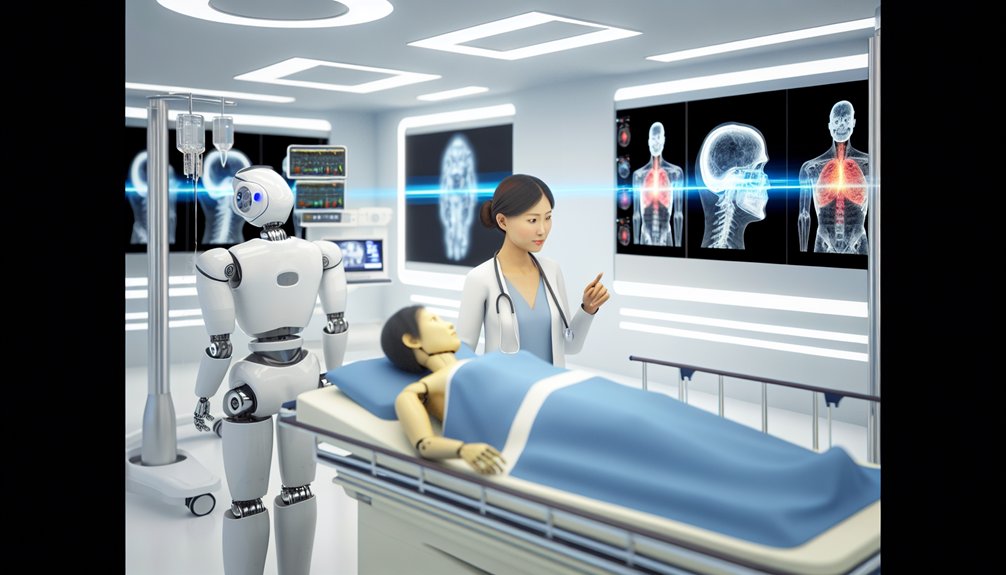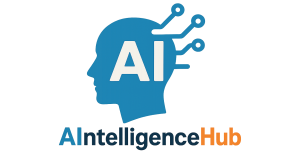
AI breakthroughs are revolutionizing healthcare technology by empowering you with more accurate diagnostics through sophisticated algorithms that spot subtle patterns early. You’ll experience personalized treatment plans as machine learning tailors care based on your unique genetic, lifestyle, and environmental factors. Administrative tasks become smoother with AI-driven automation, enhancing operational efficiency. In research, AI accelerates drug discovery and genetic analysis. Furthermore, your healthcare experience improves through real-time monitoring and telemedicine. Discover how these advanced technologies transform your healthcare journey.
Enhancing Diagnostic Accuracy With AI Algorithms

In today’s rapidly evolving healthcare landscape, AI algorithms are revolutionizing diagnostic accuracy by providing unprecedented levels of precision and efficiency. You leverage cutting-edge image recognition technologies to analyze complex medical images with remarkable speed and accuracy, surpassing traditional methods. AI’s ability to identify subtle patterns enhances early detection of diseases, improving patient outcomes considerably. Additionally, predictive analytics empower you to anticipate potential health issues before they manifest, offering a proactive approach to patient care. By analyzing vast datasets, AI uncovers hidden correlations and trends, enabling more informed decision-making. As a healthcare professional, integrating these tools enhances your diagnostic capabilities, ensuring timely and accurate diagnoses. Embracing AI not only streamlines workflows but also elevates the standard of care you provide.
Transforming Patient Care Through Personalized Treatment Plans
While leveraging AI in healthcare, you’re at the forefront of transforming patient care through personalized treatment plans. Machine learning algorithms analyze patient data, uncovering patterns that human analysis might miss. By using predictive analytics, you’re able to forecast individual health trajectories, enabling tailored interventions. This approach guarantees treatments are more effective, minimizing trial-and-error methods.
AI’s capability to process vast datasets means you can develop treatment plans that consider genetic, lifestyle, and environmental factors. This holistic view isn’t just theoretical; it’s practical and actionable. You’re not only enhancing treatment efficacy but also improving patient satisfaction. Patients receive care that aligns with their unique needs, reducing adverse reactions and improving outcomes. Personalized treatment isn’t just the future; it’s a transformative present.
Streamlining Administrative Tasks With Ai-Driven Automation
As AI revolutionizes patient care through personalized treatment plans, it also reshapes the administrative landscape in healthcare. You can now streamline tasks with AI-driven automation, optimizing workflows and improving efficiency. Imagine reducing the burden of manual data entry, allowing healthcare providers to focus more on patient care. AI enhances patient scheduling by considering preferences and predicting no-shows, thereby maximizing appointment slots.
Here are some key benefits of AI-driven automation in healthcare administration:
- Workflow optimization: Guarantees smoother operations and fewer delays.
- Efficient patient scheduling: Matches patient availability with provider schedules.
- Automated billing processes: Reduces errors and accelerates revenue cycles.
- Real-time data access: Provides timely information for better decision-making.
- Enhanced compliance management: Keeps track of regulatory requirements effortlessly.
Incorporating AI transforms administrative efficiency, ultimately benefiting both providers and patients.
Advancing Medical Research and Drug Discovery

Though often complex and time-intensive, the landscape of medical research and drug discovery is being transformed by AI, driving unprecedented efficiency and innovation. You can now analyze vast genomic datasets in ways previously unimaginable, identifying potential drug targets with remarkable precision. AI’s power in genomic analysis accelerates the identification of genetic markers, honing in on personalized medicine. In addition, AI optimizes clinical trials by predicting outcomes and matching patients more effectively, reducing costs and time. This evolution in drug discovery isn’t just technical—it’s personal, impacting lives globally.
| AI Benefits | Emotional Impact |
|---|---|
| Faster discoveries | Hope for patients |
| Cost efficiency | Accessibility of treatment |
| Precision | Increased safety |
| Personalized care | Improved quality of life |
AI’s role in medical research signifies a leap towards a healthier future.
Improving Remote Monitoring and Telemedicine Services
With the integration of AI, remote monitoring and telemedicine services are evolving swiftly, providing patients with unprecedented access to healthcare. Wearable devices play a crucial role, continuously collecting data on essential signs and health metrics. This data enables real-time analysis, alerting healthcare providers to any concerning changes. Enhanced patient engagement is achieved through personalized health insights delivered via telemedicine platforms. These advancements guarantee healthcare is proactive rather than reactive.
- Real-time data collection: Wearable devices monitor essential signs like heart rate and blood pressure.
- Predictive analytics: AI anticipates potential health issues, allowing early intervention.
- Improved communication: Patients and providers connect seamlessly through secure platforms.
- Cost efficiency: Reduces the need for in-person visits, optimizing healthcare resources.
- Patient empowerment: Access to personalized health information increases patient engagement.
Frequently Asked Questions
How Does AI Address Data Privacy Concerns in Healthcare?
AI addresses data privacy concerns in healthcare by implementing robust data encryption methods, guaranteeing patient information remains confidential. You ascertain patient consent by integrating AI systems that strictly follow privacy regulations, like GDPR. By automating consent management, AI tracks who accesses data and why, providing transparency. In addition, AI’s ability to detect anomalies in data access patterns helps you identify potential breaches, enhancing security while maintaining trust in patient privacy.
What Role Does AI Play in Mental Health Treatment?
Imagine AI therapy as a guiding light in the labyrinth of mental health treatment. You’ll find AI using predictive analytics to anticipate patient needs, offering personalized interventions faster than ever. It analyzes patterns in your behavior, providing insights and tailored support. By tapping into vast data pools, AI predicts outcomes and suggests treatments, making mental health care not just reactive, but proactive. It’s not just technology; it’s a revolution in understanding you better.
How Are AI Tools Regulated in the Healthcare Industry?
When you’re exploring how AI tools are regulated in healthcare, it’s essential to understand AI compliance within regulatory frameworks. These frameworks guarantee that AI systems meet stringent safety standards. Clinical validation is important, confirming that AI tools reliably perform in real-world settings. By steering through these regulations, healthcare providers can harness AI’s potential while safeguarding patient welfare. Your grasp of these processes guarantees AI innovations remain both effective and safe in medical applications.
What Are the Challenges of Integrating AI Into Existing Healthcare Systems?
Imagine a jigsaw puzzle where each piece represents a part of the healthcare system. Integrating AI is like adding a new dimension. You face challenges with data interoperability, ensuring all pieces connect smoothly. User training is another hurdle; it’s vital for staff to understand and trust the new tools. You need to bridge the technical gap, ensuring AI’s seamless integration into existing workflows without disrupting patient care or data flow.
How Does AI Impact the Cost of Healthcare Services?
AI’s impact on healthcare costs is profound. You see cost reduction through streamlined processes, minimizing waste, and automating routine tasks. Efficiency improvement comes from AI’s ability to quickly analyze vast data, providing faster diagnoses and personalized treatments. This enhances patient outcomes, reducing hospital stays and unnecessary procedures. By integrating AI, you’re not just cutting costs; you’re boosting overall system efficiency and delivering high-quality care more consistently and effectively.
Conclusion
So, you’ve got AI swooping in like a superhero, fixing all those pesky healthcare issues humans just can’t handle. It’s like having a doctor, researcher, and admin assistant rolled into one snazzy algorithm. AI’s diagnosing, personalizing treatments, and even doing paperwork—who knew robots loved office chores? With AI, remote monitoring’s a breeze, and drug discovery’s a walk in the park. So, sit back, relax, and let the machines revolutionize healthcare while you binge-watch another series.



